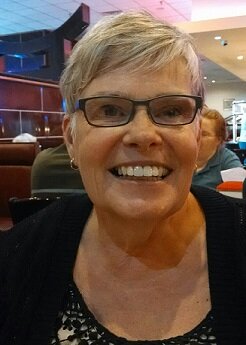The Night Sky Shining with Grace
Come, she says. Let’s look at the New Mexico night sky.
Outside, in the stillness, above us, breaking through the veil of the universe, shining dots of light—pinpricks in the luminous darkness, revealing the Creator’s existence behind it all, behind what we see, pushing through to reach us.
These are your memories, she says.
“They are stars,” I say.
Let’s use our imagination, she says, continuing:
What you see is the light that lasts, for the act in each moment of your abundant life is far behind what is left. What is left is what you remember.
The act, as is true with many of these stars, no longer exists. What we have is the brightness of that moment, of what was. The star might be gone, but its light reaches us, shining as if it were still there.
I ponder, nodding in the darkness. She knows all my moments, all my memories. She knows everything about me. About us.
Let’s name them, she says.
“Each memory?”
She laughs. Let’s name some of them.
“Ok, cool,” I say. Above the kiva ladder—looking as if it were the “stairway to heaven”—I arch my hand with the Milky Way, as if caressing it. “That stunning cluster of sweeping stars,” I say, “are the memories I have of my children and their children. Those create a shining archway to everything else around it.”
Nice, she says. Go on.
“To the left and high,” I say, pointing, “is a grouping of intensely bright memories.”
And they are?
“Those are memories of my life and friends of Grace.”
Let’s name them, she says.
“Name these stars?”
Sure. Name the stars as memories. Name them the names you choose. I’ll start, she says.
“Fun,” I say.
That one, she points, I call Abundance. It stands for this sky, abundant with stars, abundant with memories. I nod. She continues, Ok, now you. Name them then add the memory. She laughs and says, I mean, briefly add the memory.
“Ok,” and one by one, pointing to stars, I name and remember, saying:
I see Hope—The Mission of Grace, next door to the chapel, helping the neighborhood and community, offering Hope.
There is Joy—Babies are being held by one person then the next, down the aisle of the small chapel; I love when my turn comes to cuddle the tiny sweet ones. My daughter, Elaine, is born in 1986; my son Sean in 1989.
Of course! Play—Elaine runs with the other children in the Grace side yard; later, baby brother Sean tries to keep up.
And speaking of Sean, there is Resilience—Such a hyper toddler, who can’t sit still or stay quiet for longer than five minutes. We sit in the back, and his dad and I take turns walking outside with him throughout the hour.
Laughter—Elaine, age 7, and Sean, age 3, are being baptized together, both dressed in white, standing at the steps before the altar. Their dad has been telling them bedtime stories about the adventures of a boy named Henry. The loving interim pastor says Sean’s name for baptism, and three-year-old Sean interrupts, saying, “My name is Henry.” All watching chuckle. The pastor smiles. We are all in suspense…will the pastor say “Henry?” If he doesn’t, will Sean keep interrupting, insisting his name is Henry? This memory flickers. I think pastor says both names. “I baptize Sean, also called Henry…” Which seems to satisfy Sean, who doesn’t ask to be called Henry again. That day, asking for a different name serves its purpose. To this day, Sean continues to entertain audiences.
Blessing—During the service, we name those in need by name, and we bless each one.
Sharing—Downstairs, we have classes. We share meals. On Maundy Thursday, we take turns at the altar, washing each other’s feet.
Caring—We all pitch in together, cleaning the beautiful chapel.
This one has three names, Faith, Acceptance and Beauty—A large, richly-colored and gorgeous stained glass window above the altar of Jesus kneeling at a rock, praying in the garden, asking fervently for a different destiny but also accepting his purpose. It is a weekly focal point of artistic beauty.
Growth—A friend tells me she is using her vacation to look for information about her ancestors. I asked her where that might be. She answers—she is going to the quarters of family who had been enslaved and other places that might possibly have some records of her family. I am quiet. I have no words. I realize at that moment that her life and mine are different in foundational ways. I realize that I don’t know about my own white privilege. I realize that moment is the beginning of a lifetime of learning about white privilege.
Forgiveness—I take home a book from the shelf “library” at the back of the church. Somehow, it speaks to me. I have a transformative experience. I learn I am a hypocrite, judging others, but not confronting my won indiscretions and frailties. I call friends and family and ask for their forgiveness. Most say there is nothing to forgive. But I know there is. Also, I need to learn to forgive myself. I cry. And suddenly, though I was a terrible singer before, I can sing. All I want to do is sing.
Song—This is an intense star of memory. The voices of the choir are powerful and stunning. Often several listeners cry during the singing. After my transformative moment, I sing joyously—and miraculously on key—from the back of the church. I am heard. I am asked, I believe by the Music Director to join the amazing choir, The Sounds of Grace.
Voice—Eventually, I will lose my singing ability as it transforms to a different musical form, that of lyrical poetry. And I learn Voice is also about being an individual, never being a product of societal expectations or training.
That one has two names, Heartbreak and Opportunity—in 1993, I begin to realize I need to leave my hometown to pursue my dream, my calling, to begin graduate school at Indiana University in Bloomington, Indiana, to someday, hopefully, be a professor and a poet. But, I don’t want to leave my friends at Grace.
Tenderness—I am crying; I am confused about my life. My friends’ arms are around me.
Yes, that one is Gratitude—I am at my lowest and most confused. My friends support me with love, so that I can figure out what is best for my one life, to heed my calling.
Support—My friend tells me, “Maybe the purpose of Grace, for you, is that we are here, supporting you, helping you prepare for what comes next.” What could be more supportive?
Love—Navigating my life from that moment happens with trials, but successfully, as the love I receive from my friends at Grace and from some of my other friends and family, though we become distant, is constant. As is the love I receive from a higher power, bestowing on me the belief in a divine order. This is my North Star.
I gaze at the gorgeous array before me. “You are right,” I say. “There is an abundance of memories for which to be grateful. Another night, I will name more stars, more memories.”
But now it’s time for a restful sleep in the arms of Faith, she said.
Together, my Soul and I retire for the day, our memories enriching Heaven.
Embudo, New Mexico. Photo by Mike Lewinski on Unsplash
From the webpage of the Mission of Grace in Evansville, Indiana:
The Mission of Grace provides emergency financial assistance for rent, utilities, prescription medication and food. We also offer information and referrals to other appropriate resources in the community, and provide counseling and spiritual support to those in need.
Creatives in Conversation Hour is honored to present June 17th Featured Creatives:
Zoom in from anywhere to hear stories
of outreach, service, care & uplifting songs,
featuring the Mission of Grace!
Singing by Music and Worship Director
Gina Moore
and
Stories of outreach, service and care by
Pastor Roberta Meyer
and Director Vicki Nixon Oshodi
Wednesday, June 17, 5:30 to 6:45 pm MDT (6:30 to 7:45 pm CT)
“Every human activity can be put at the service of the divine and of love. We should all exercise our gift to build community.”
― Jean Vanier, Community And Growth
music and worship director
Gina Moore
Pastor of Grace and Peace Lutheran church
Roberta Meyers
director of the mission of grace
Vicki Nixon Oshodi
From the Mission of Grace website:
“In 1978, the Pastor and members of a small, inner city church became aware of a crisis in the neighborhood surrounding its church. People in need were knocking on the church’s door to ask for assistance with the basic fundamentals of life, including food, clothing, and other essentials. The need was vast, and many times overwhelming.
Because of the need a new outreach ministry was developed. It is called the Mission of Grace. The church began by seeking the resources of individuals who volunteered their time, money and prayers. Soon an organization was created and the Mission of Grace began its work. Since that time the Mission of Grace has served over 200 clients each month.”
Blog author Mary Dezember shown with family in1993 in the front yard of Grace Lutheran Church in Evansville, Indiana.
about the blog author
Mary Dezember, PhD, is a poet and author of fiction and non-fiction. She earned her PhD in Comparative Literature, specialization in Comparative Arts, from Indiana University in 2000, with PhD minors in Art History and Performance Studies. Professor of English, she teaches Comparative Arts, Art History, Creative Writing and Literature at New Mexico Institute of Mining and Technology. Her publications include several non-fiction essays and articles and two books of poetry: Earth-Marked Like You (Sunstone Press) and Still Howling (CreateSpace Independent Publishing). Her novel, Wild Conviction, is in the works to be published by Inkshares.
Shown inTaos, New Mexico, Christmas Day, 2019.
Mary Dezember speaks briefly of her novel Wild Conviction and how her mother, grandmother and her friends at Grace inspired her.






